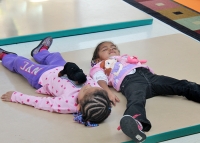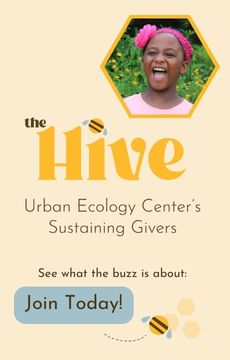To be focused is a skill, one that kids might find quite natural or quite challenging. We wanted to encourage all of the kids in our Young Scientists Club after-school program to either develop or maintain this skill. Therefore, inspired by an abundance of scientific and anecdotal evidence that showed that mindfulness practices improve a child’s mood, behavior, and propensity for learning, our Community Programs team at Washington Park decided to test out its effects.
We incorporated mindfulness and yoga-inspired movement into the Young Scientists activities. We explored different breathing exercises, starting off with simply paying attention to the movement of our diaphragm and moving on to more complex breathing techniques. On our mats, we discovered the power and entertainment of balancing postures. Our time together often has a weather theme, which helps illustrate how human movement can be in congruence with what can be seen in nature.
For us, the results were astounding! Even the kids that could not contain their giggles in their “downward facing dog” would welcome the relaxation and the rest of shavasana — a pose during which you lie on your back and work to remain fully awake but deeply relaxed. They would eagerly accept the brief stillness and seemed to assume a calmer mood altogether.
Additionally, they were delighted to show off their tree poses to their peers, parents and other teachers. We hope that with continuity and repetition, our Young Scientists will be able to transfer the feelings of confidence, presence in one’s body and focus, into all the other types of activities. So far, bird watching as well as using microscopes was a breeze! Thus, they were able to let their curiosity run wild, as well as focus on tasks at hand, to get a truly in-depth experience of discovery! As a teacher, it is always a pleasure to take a step back and allow curiosity to take its course.
Want your child to join us during our mindfulness practices, or any other activity of the Young Scientists Club at Washington Park (designed for children ages 4-12)? Please drop by between Tuesdays and Fridays at 4pm or on Saturdays at 1pm. The annual participation fee is $10, scholarships available!





